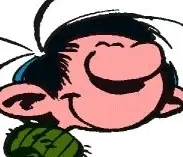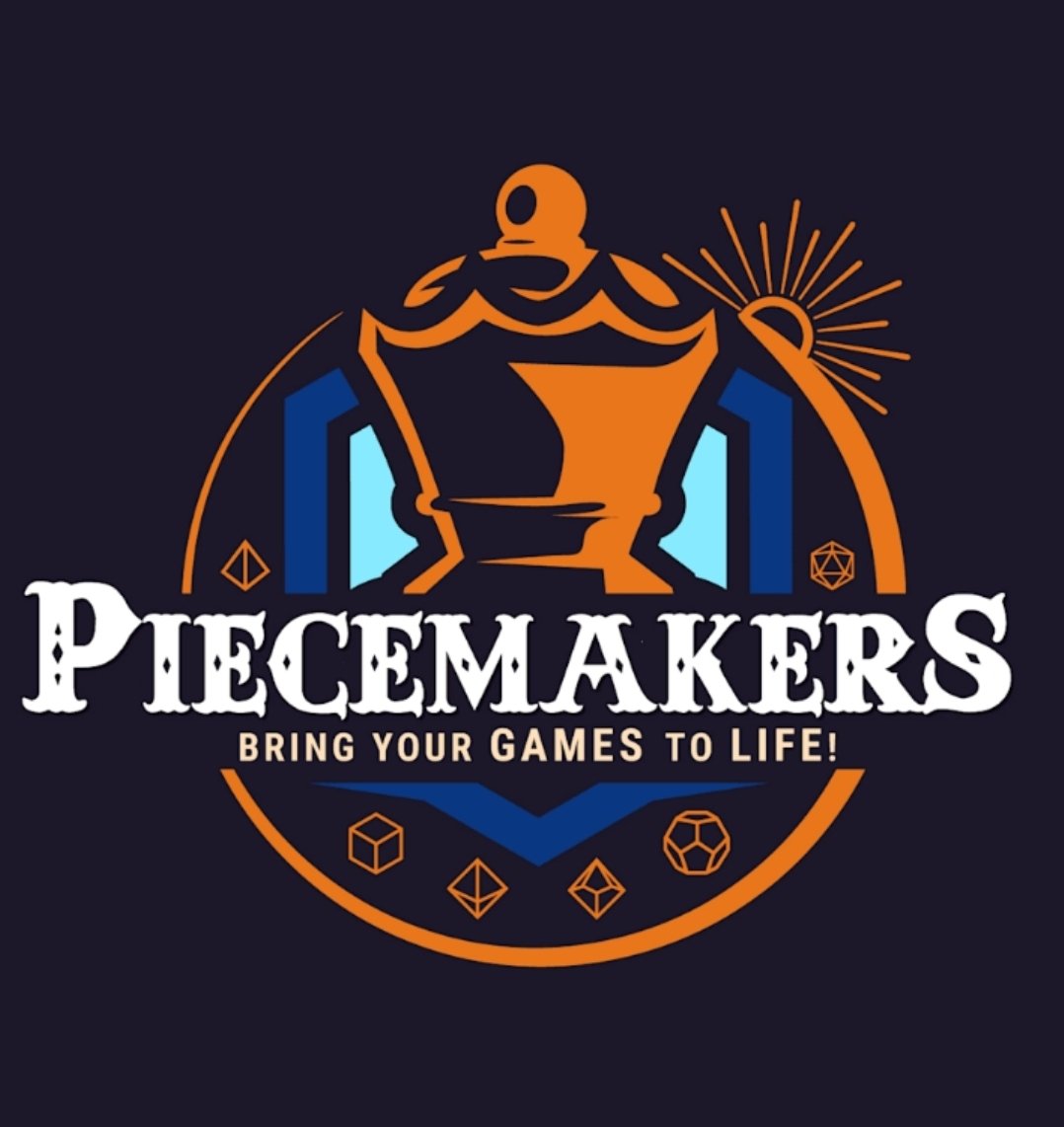The goal of this post is to discuss whenever “AI art” is good, bad, or irrelevant to graphic novels.
I have been playing around with AI image creation tools since last year. Midjourney first, then Dalle, and most recently Stable Diffusion.
All images in this post I “created” using Moebius based text prompts today. The quotation marks are intended as the only thing I have created are text prompts. Whenever the AI created these images is highly debatable. If I feed an AI model ten thousand panels of Moebius art and the AI returns one panel based on them, then who is the creator?
Feel free to discuss the legality (copyright) of this technology, who should get the royalties or the credit. Or to discuss whenever it is ethical, but what is really interesting to me is to determine if this technology is good, bad or irrelevant for us, graphic novels readers.
I know that a true connoisseur is likely to differentiate within the below images and the true work from Moebius, but for how long? We are at the verge of reaching a point where this differentiation will be impossible. Moebius passed away in 2012, so this differentiation may be possible with external tools, but what about living artists? Furthermore, what if a living artist publishes a book using AI generated art based on his own work. Is that acceptable? Should the artist disclose the AI use to the public? All that will probably come with regulation, or not, who knows.
I prefer human-made art before computer-made art, especially when it comes to graphic novels. This despite knowing that some of the artists that I follow already use CGI to a greater or lesser extent, that is fine… But AI generated art is in another level, something that I do not want to welcome with open arms. Having said that, is the same as with any other technology, like it or not, it is here to stay.
So what is your opinion on this matter?


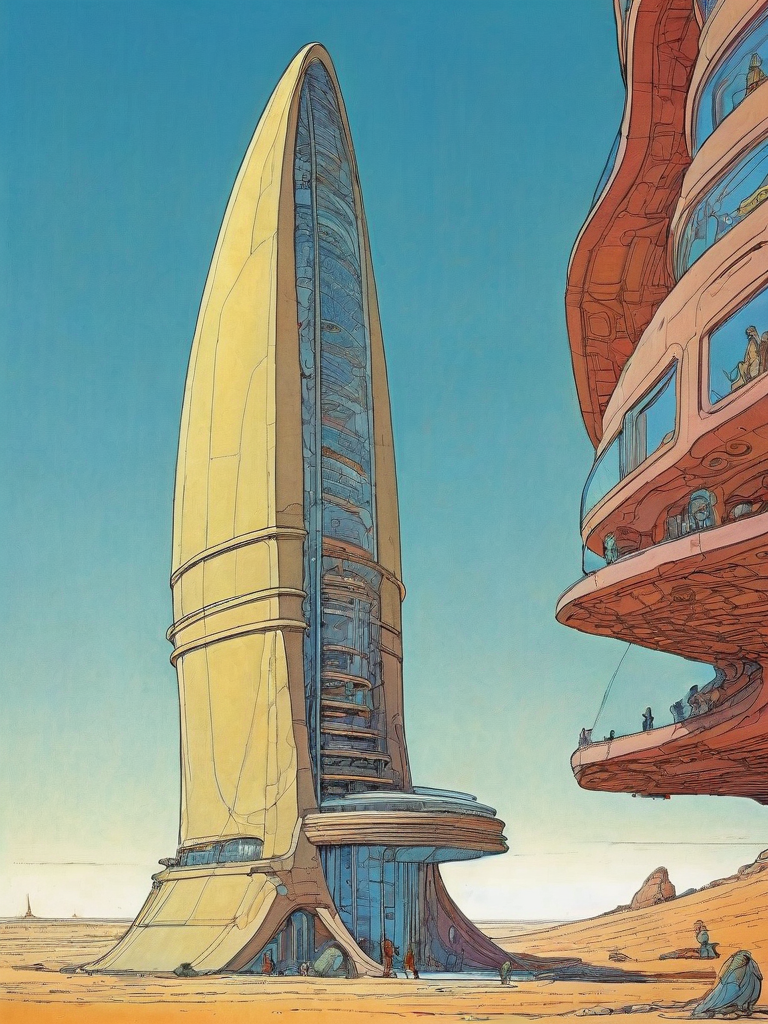

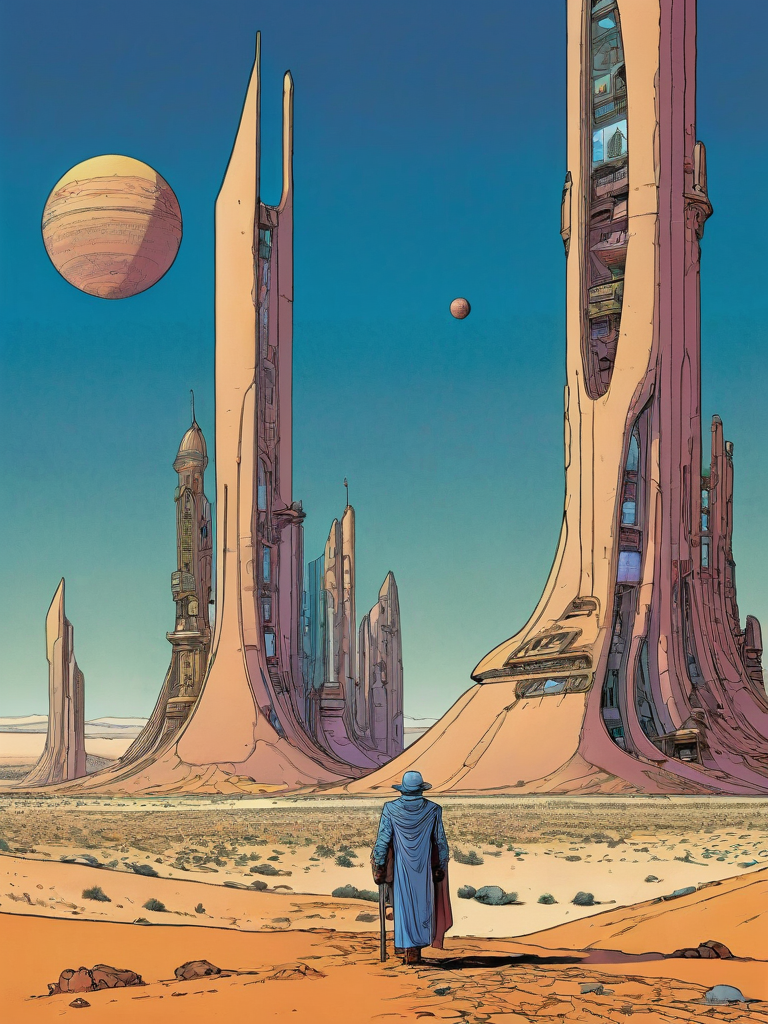
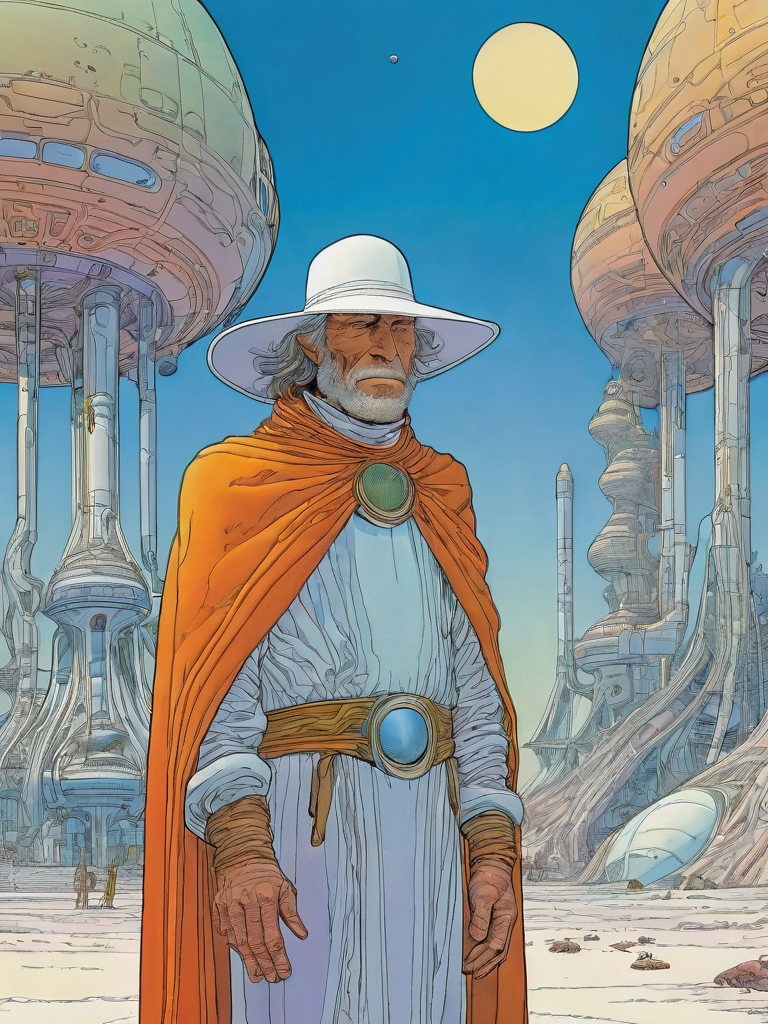
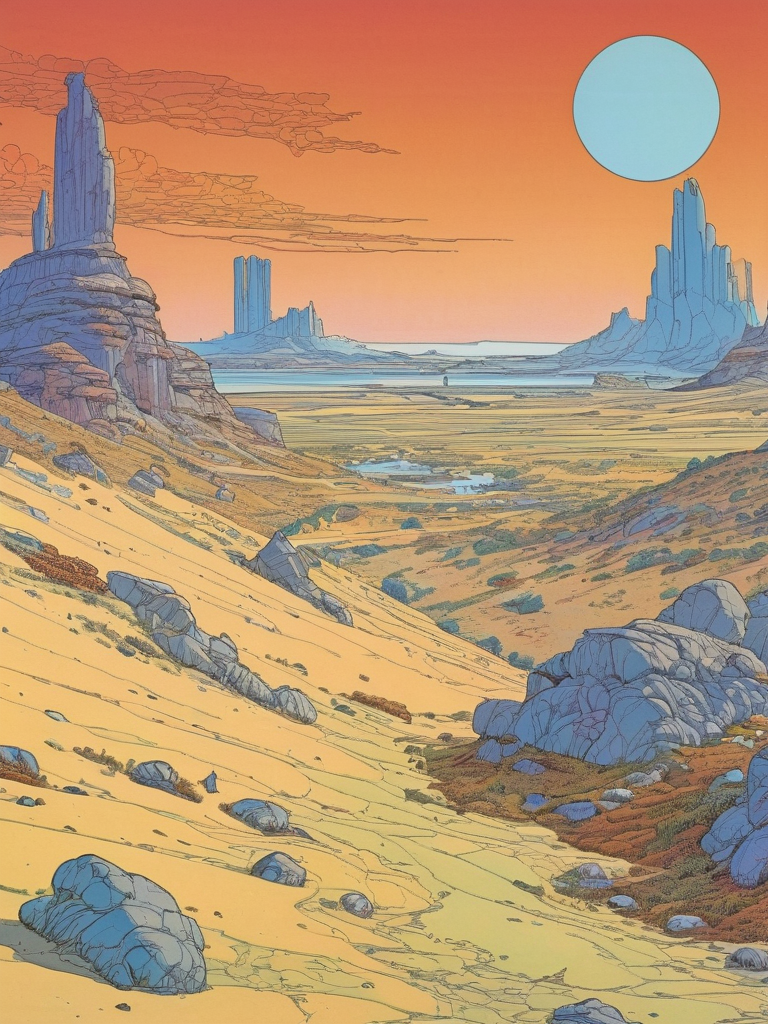


P.S: I believe I am not breaking any community rule, but if I am then please delete this post.
They are really impressive as they capture the style and colours, the problem is you get out what you put in. Making comics is a collaborative effort and the artist (and colourist and letterer) bring so much more to the table - their input and ideas adds whole new layers on top of the words and can send the project off in a different direction.
Alan Moore writes incredibly detailed scripts laying pretty much everything out in each panels and the first thing the artists do is go through with coloured marker pens picking out the things they want to include because one of their jobs is to make sure the story flows properly from panel to panel and across the page. They can pick up any issues in the visual storytelling and then push themselves to go above and beyond.
So AI can create pretty pictures but it still struggles to create coherent comics.
So AI can create pretty pictures but it still struggles to create coherent comics.
Correct, but for how long? Eventually an AI user (artist or not) will be able to create proper storylines.
They’ll be able to make a coherent comic page but what else are they bringing to the table beyond a degree of variation around a theme? They can never go “great idea, I saw this film once and wonder if something like this would work.” Then the writer takes the ball knocked back to them and adds another layer. AI can produce something that resembles this process but it can’t possibly get that spark that happens when two or more people are collaborating together as they might drag in something they heard on the bus, something random they saw while flicking channels an hour before, and on and on.
And it’s interesting that it creates art like Moebius but what about the next artist who goes off with their own innovative style?
And it’s interesting that it creates art like Moebius but what about the next artist who goes off with their own innovative style?
This is a good point. At the current stage, AI can copy, but can’t innovate… I wonder if it will ever reach that point.
AI can copy, but can’t innovate
Is that true in real-world terms, though?
Because as is, one can spend only a tiny effort using ChatGPT and generate medium-sized works of fiction that are functionally brand-new. Yes-- I realise that they’re still ultimately based on material they’ve been fed, but the more material they’ve absorbed, I imagine the less that’s necessarily a constraint.
On top of that, is there anything preventing the prompter from doing the heavy-lifting of ‘innovation,’ creating the skeleton of the plot, while ChatGPT fleshes it all out?
Btw, Cabeza-- thanks for creating this thoughtful thread of scenarios and art. It’s nice to have discussions like these, and these issues clearly aren’t going away.
Is that true in real-world terms, though?
Considering how the AI technology works today, yes, I believe it is true. We can feed an AI model 100,000 images of animals and then play with it to see what “new” animals it creates… But that is no innovation for me. The technology may get there, eventually, but it is not at that point now.
Because as is, one can spend only a tiny effort using ChatGPT and generate medium-sized works of fiction that are functionally brand-new. Yes-- I realise that they’re still ultimately based on material they’ve been fed, but the more material they’ve absorbed, I imagine the less that’s necessarily a constraint.
Still. We can get the AI to mix multiple styles to the point that the outcome is disguised, or so loosely related to the original sources that one cannot recognize the parts, but even then, this is not what innovation is.
On top of that, is there anything preventing the prompter from doing the heavy-lifting of ‘innovation,’ creating the skeleton of the plot, while ChatGPT fleshes it all out?
Agreed. If the AI operator (or handler) adds their own input then the outcome becomes, at least partially, innovation. I have already used AI text tools for my work, and modified the outcome to fit my needs and preferences. It may not be innovation, but it is also not 100% AI as I have added my own input.
That is no the case with this post and the Moebius “AI generated art” examples. Making a claim that text based prompts generating Moebius art is innovation is…well… an insult to Moebius.
In the other hand, if I was an actual artist, using AI to mix my own art with Moebius art, that is another story. One could call that innovation, with some reserves.
Btw, Cabeza-- thanks for creating this thoughtful thread of scenarios and art. It’s nice to have discussions like these, and these issues clearly aren’t going away.
I am happy to collaborate with our community!
If I feed an AI model ten thousand panels of Moebius art and the AI returns one panel based on them, then who is the creator? Feel free to discuss the legality (copyright) of this technology, who should get the royalties or the credit.
I guess it depends on the terms of service for the various AI tools? As in-- if you pay your service / subscription fee, then are you allowed to do whatever you want with the outputted art?
Good question about the credit. On the surface I’d think ‘created by X using Y tool after the style of Z’ seems fair & accurate, but what about people who try to play sneaky with that? Would it help if AI tools automatically included invisible but detectable traces in images to watermark their output?
Furthermore, what if a living artist publishes a book using AI generated art based on his own work. Is that acceptable? Should the artist disclose the AI use to the public?
Considering the reputational hit if they were ‘found out,’ I’d think most would want to be honest for their own good.
I know that a true connoisseur is likely to differentiate within the below images and the true work from Moebius, but for how long? We are at the verge of reaching a point where this differentiation will be impossible.
Right, that’s my concern as well. These tools have been widely used for only the past year or two. It seems ludicrous to think that they’re not going to keep improving.
They’ll be able to make a coherent comic page but what else are they bringing to the table beyond a degree of variation around a theme? They can never go “great idea, I saw this film once and wonder if something like this would work.” Then the writer takes the ball knocked back to them and adds another layer. AI can produce something that resembles this process but it can’t possibly get that spark that happens when two or more people are collaborating together as they might drag in something they heard on the bus, something random they saw while flicking channels an hour before, and on and on. –@Emperor@feddit.uk
I don’t mind that argument, as romantic / hopeful as it might be, but it leaves out the scenario of: what if a decent writer and good prompt builder decides to use AI as the artist, with no second person necessary? They could merely have a good eye and feel for detail & aesthetic, and I think it would be enough, combined with their own quality writing, to build a complete graphic novel, or at least something pretty close to that, currently.
All of that of course becoming easier with time as the tools improve, as well as their own facility with such tools.
Why would we not expect to see output like that in coming years?
I believe in the monkey selfie ruling. When a monkey takes a selfie, it doesn’t matter if it was using a camera brought to it by a professional photographer. The photographer cannot claim copyright on it, and until it gets better lawyers, neither can the monkey.
If something is generated by AI, no copyright should be puttable on it.
As for whether companies should be able to take somebody else’s data and put a fee on remixing it, I don’t think there is a legal allowance for that, and if there is, the companies that did it were using some big, blatant loopholes. I don’t know what to do about them, but OpenAI OpenA-lied about their intent
PS I love Morbius’ art
What do you think, @Piecemakers3Dprints@lemmy.world?
Where do you draw the line? (No pun intended) Do you require your art to be as purely analog as humanly possible, or do your favorite artists not have to harvest and mix their own pigments from natural pulvers in order to earn your respect? Can they use a digital scale in that process? What about sketching on a tablet? Where do you draw the line for your own personal definition of “art”, and why should anyone care at all? Genuine question.
Any opinion on the issues OP raises? For example:
-
For publishing purposes, who owns the resultant AI art, and how should it properly get credited?
-
As AI art tools continue to improve, will it eventually (read: within only a couple years) be possible to tell real Moebius art versus AI-generated Moebius art? (see examples above)
-
Do you agree with me that a good writer and prompt-maker could entirely replace an artist in producing a finished, quality graphic novel right now? Even if you say “no,” do you feel like there’s any force preventing that from happening down the road?
-

